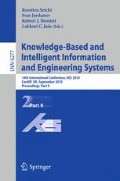Abstract
Systems for Ambient Intelligence contexts are expected to exhibit an autonomous and intelligent behavior, by understanding and reacting to the activities that take place in such contexts. These activities, specially those labeled as trivial or simple tasks, are carried out in an effortless manner by most people. In contrast to what it might be expected, computers have struggled to deal with these activities, while easily performing some others, such as high profile calculations, that are hard for humans. Imagine a situation where, while holding an object, the holder walks to a contiguous room. We effortlessly infer that the object is changing its location along with its holder. However, such inferences are not well addressed by computers due to their lack of common-sense knowledge and reasoning capability. Providing systems with these capabilities implies collecting a great deal of knowledge about everyday life and implementing inference mechanisms to derive new information from it. The work proposed here advocates a common-sense approach as a solution to the shortage of current systems for Ambient Intelligence.
This work has been funded by the Spanish Ministry of Science and Innovation under the project DAMA (TEC2008-06553/TEC), and by the Regional Government of Castilla-La Mancha under project RGRID (PAI08-0234-8083).
Access this chapter
Tax calculation will be finalised at checkout
Purchases are for personal use only
Preview
Unable to display preview. Download preview PDF.
References
Ducatel, K., Bogdanowicz, M., Scapolo, F., Leijten, J., Burgelman, J.C.: ISTAG: Scenarios for ambient intelligence in 2010. Technical report, ISTAG (2001)
Wilensky, R.: Planning and Understanding. Addison-Wesley, Reading (1983)
Amigoni, F., Gatti, N., Pinciroli, C., Roveri, M.: What planner for Ambient Intelligence applications? IEEE Transactions on Systems, Man, and Cybernetics, Part A 35(1), 7–21 (2005)
Erol, K., Hendler, J., Nau, D.S.: HTN planning: Complexity and expressivity. In: AAAI 1994 (1994)
Villanueva, F.J., Villa, D., Santofimia, M.J., Moya, F., Lopez, J.C.: A framework for advanced home service design and management. IEEE Transactions on Consumer Electronics 55(3), 1246–1254 (2009)
Mueller, E.T.: Commonsense Reasoning. Morgan Kaufmann, San Francisco (2006)
Hommel, B., Musseler, J., Aschersleben, G., Prinz, W.: The theory of event coding (TEC): A framework for perception and action planning. Behavioral and Brain Sciences 24, 849–878 (2001)
Bach, K.: Actions are not events. Mind 89, 114–120 (1980)
Hyman, J.: Three fallacies about action. In: 29th International Wittgenstein Symposium (2006)
Georgeff, M.P.: A theory of action for multiagent planning. In: Bond, A.H., Gasser, L. (eds.) Readings in Distributed Artificial Intelligence, pp. 205–209. Kaufmann, San Mateo (1988)
W3C: OWL web ontology language home page (2009), http://www.w3.org/TR/owl-features/ (retrieved March 15, 2009)
W3C: Resource description framework (RDF) (2010), http://www.w3.org/RDF/ (retrieved February 28, 2010)
DiBernardo, M., Pottinger, R., Wilkinson, M.: Semi-automatic web service composition for the life sciences using the biomoby semantic web framework. J. of Biomedical Informatics 41(5), 837–847 (2008)
Cycorp, I.: The Cyc project home page (2008), http://www.cyc.com (retrieved on December 10, 2008)
Fahlman, S.E.: The Scone knowledge-base project (2010), http://www.cs.cmu.edu/sef/scone/ (retrieved on February 28, 2010)
Davidson, D.: The Essential Davidson. Oxford University Press, USA (2006)
Chen, W., Fahlman, S.E.: Modeling mental contexts and their interactions. In: AAAI 2008 Fall Symposium on Biologically Inspired Cognitive Architectures, Washington (2008)
Fahlman, S.E.: Marker-passing inference in the scone knowledge-base system. In: Lang, J., Lin, F., Wang, J. (eds.) KSEM 2006. LNCS (LNAI), vol. 4092, pp. 114–126. Springer, Heidelberg (2006)
Wooldridge, M.J.: Reasoning about Rational Agents. The MIT Press, Cambridge (2000)
Pokahr, A., Braubach, L., Lamersdorf, W.: Jadex: A BDI reasoning engine. In: Multi-Agent Programming, pp. 149–174. Springer Science+Business Media Inc., USA (September 2005)
ZeroC, I.: Ice home page (2008), http://www.zeroc.com/ (retrieved December 20, 2008)
Author information
Authors and Affiliations
Editor information
Editors and Affiliations
Rights and permissions
Copyright information
© 2010 Springer-Verlag Berlin Heidelberg
About this paper
Cite this paper
Santofimia, M.J., Fahlman, S.E., Moya, F., López, J.C. (2010). A Common-Sense Planning Strategy for Ambient Intelligence. In: Setchi, R., Jordanov, I., Howlett, R.J., Jain, L.C. (eds) Knowledge-Based and Intelligent Information and Engineering Systems. KES 2010. Lecture Notes in Computer Science(), vol 6277. Springer, Berlin, Heidelberg. https://doi.org/10.1007/978-3-642-15390-7_20
Download citation
DOI: https://doi.org/10.1007/978-3-642-15390-7_20
Publisher Name: Springer, Berlin, Heidelberg
Print ISBN: 978-3-642-15389-1
Online ISBN: 978-3-642-15390-7
eBook Packages: Computer ScienceComputer Science (R0)

